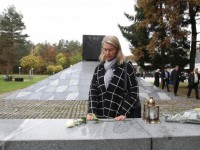PEACE UNTO US: A LETTER TO OUR BOSNIAN-HERZEGOVINIAN AND CROATIAN FRIENDS

We address this letter to peacekeepers of all generations, and to all those who care about peace. For days, we have followed with understanding and sadness the loud protests in Bosnia and Herzegovina over the announced mass that is to be held in Sarajevo by the Archdiocese of Vrhbosna as part of this years' commemoration of the 75th anniversary of the surrender of the Axis powers near Bleiburg – which is to be organised by the Bleiburg Guard of Honour, under the auspices of the Croatian Parliament. We are concerned about peace in the region, achieved at great effort. We regret that the official messages coming from our country are not those of building trust, but that, after subdued celebrations of Victory Over Fascism Day and Europe Day, Croatia, a European Union member, has instead exported into Bosnia the discord of a politics that is too weak to break with the Ustasha greeting.
After we were informed by Austria that commemorating the deaths of members of the Ustasha and Chetnik armies as well as other collaborationists, we can all now better see, from a greater proximity, the details of the missed opportunities to confront the gradual acceptance of paying respect to representatives of the regime responsible for the genocide against Jews, Serbs, the Roma committed between 1941 and 1945, and for the eliminations of the left-wing partisans and their sympathisers of all nationalities, including many Croats. The consequences of the decision by the Croatian Parliament to declare 15 May a day of remembrance of the "Croatian victims of the struggle for freedom and independence" and to sponsor the commemoration, which does not only concern the murdered family members and captive mobilised soldiers killed in revenge, but also involves paying respect to criminals from the Jasenovac and other camps, who only unconditionally surrendered on that day. Uncritical victimisation of those killed at Bleiburg sends a message that in May 1945 only those people were killed whose sole crime was their love of their homeland. Such interpretations of the Second World War and the violence in its aftermath are not only historically incorrect, but exert a toxic influence over the contemporary society.
We agree with the opinion of brother Marko Oršolić, who wrote that: "It is unwise to hold a mass for the victims of Bleiburg if you have not shielded the faithful with social and physical distance from the virus of fascism." Our present is fraught with a confusing view of our past, and a peaceful and civilised future may be in question unless we have the intelligence, courage and strength to oppose the virus. It is not enough merely to remember the victims of fascism; it is essential to unmask fascism today – at our doorsteps and in our homes. We need the sense to articulate clearly, forthrightly and without guile, what we want to do and how to do it. We need the courage to embark on this and the strength to see it through.
Social reconciliation when it comes to the past is necessary. Attempts to falsify history do not help it. It needs to be openly said that the Bosnian-Herzegovinian and Croatian societies need the discussion about the Ustashe and the Partisans – but not discussion that boils down to who killed whom more, and when, which does not mean that conversation about the crimes committed should be dodged, but that such discussions should primarily concern themselves with what each group stood for, in what context, when, and how they operated and how they went about achieving it.
On this day, the day the World War Two battles in the then-Yugoslavia came to an end, we express our sadness for those who were killed, asking the governments, establishments, institutions, churches and media what they have done, are doing, and are going to do to critically reconsider the past and to pay their respects to the victims? Because everyone has the right to a grave and a quiet memorial among their kith and kin, but official tributes must not legitimise crime and contribute to political and ideological manipulations involving the victims. Finally, we ask ourselves, as well as everyone else: As humans, how do we recognise human suffering without denying the facts?
Documenta – Centre for dealing with the past



